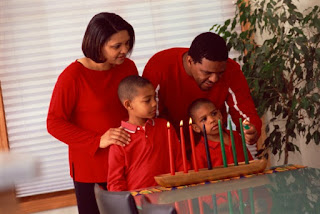First Day of Kwanzaa - Unity
Kwanzaa started today (Dec 26) and runs through January 1. Historically, Kwanzaa was created in 1966, in order to give African Americans an alternative to the existing holiday and to give African Americans an opportunity to celebrate ourselves and our history.
What an awesome opportunity for African Americans to reflect on our history and to learn more about how this seven day process can help to teach, renew and revitalize our lives and share the principles and values that create hope, love and respect for our people and communities.
Kwanzaa is a celebration that has its roots in the black nationalist movement of the 1960s, and was established as a means to help African Americans reconnect with their African cultural and historical heritage by uniting in meditation and study of African traditions and Nguzu Saba, the "seven principles of African Heritage" which Karenga said "is a communitarian African philosophy".
During the early years of Kwanzaa, Karenga said that it was meant to be an alternative to Christmas, that Jesus was psychotic, and that Christianity was a white religion that black people should shun.[5] However, as Kwanzaa gained mainstream adherents, Karenga altered his position so that practicing Christians would not be alienated, then stating in the 1997 Kwanzaa: A Celebration of Family, Community, and Culture, "Kwanzaa was not created to give people an alternative to their own religion or religious holiday."[6]
Many Christian African Americans who celebrate Kwanzaa do so in addition to observing Christmas.[7]
In 2009, Maya Angelou narrated the award-winning documentary The Black Candle, the first film about Kwanzaa.
Kwanzaa celebrates the seven principles of African Heritage. Each of the seven days of Kwanzaa is dedicated to the following principles:
- moja (Unity): To strive for and to maintain unity in the family, community, nation, and race.
- Kujichagulia (Self-Determination): To define ourselves, name ourselves, create for ourselves, and speak for ourselves stand up.
- Ujima (Collective Work and Responsibility): To build and maintain our community together and make our brothers' and sisters' problems our problems, and to solve them together.
- Ujamaa (Cooperative Economics): To build and maintain our own stores, shops, and other businesses and to profit from them together.
- Nia (Purpose): To make our collective vocation the building and developing of our community in order to restore our people to their traditional greatness.
- Kuumba (Creativity): To do always as much as we can, in the way we can, in order to leave our community more beautiful and beneficial than we inherited it.
- Imani (Faith): To believe with all our heart in our people, our parents, our teachers, our leaders, and the righteousness and victory of our struggle.
The Kwanzaa celebration gives us an opportunity to practice and focus on our rich heritage and gets us back on track to what is important for the future of our families, businesses, children and our beliefs.



Comments
Post a Comment